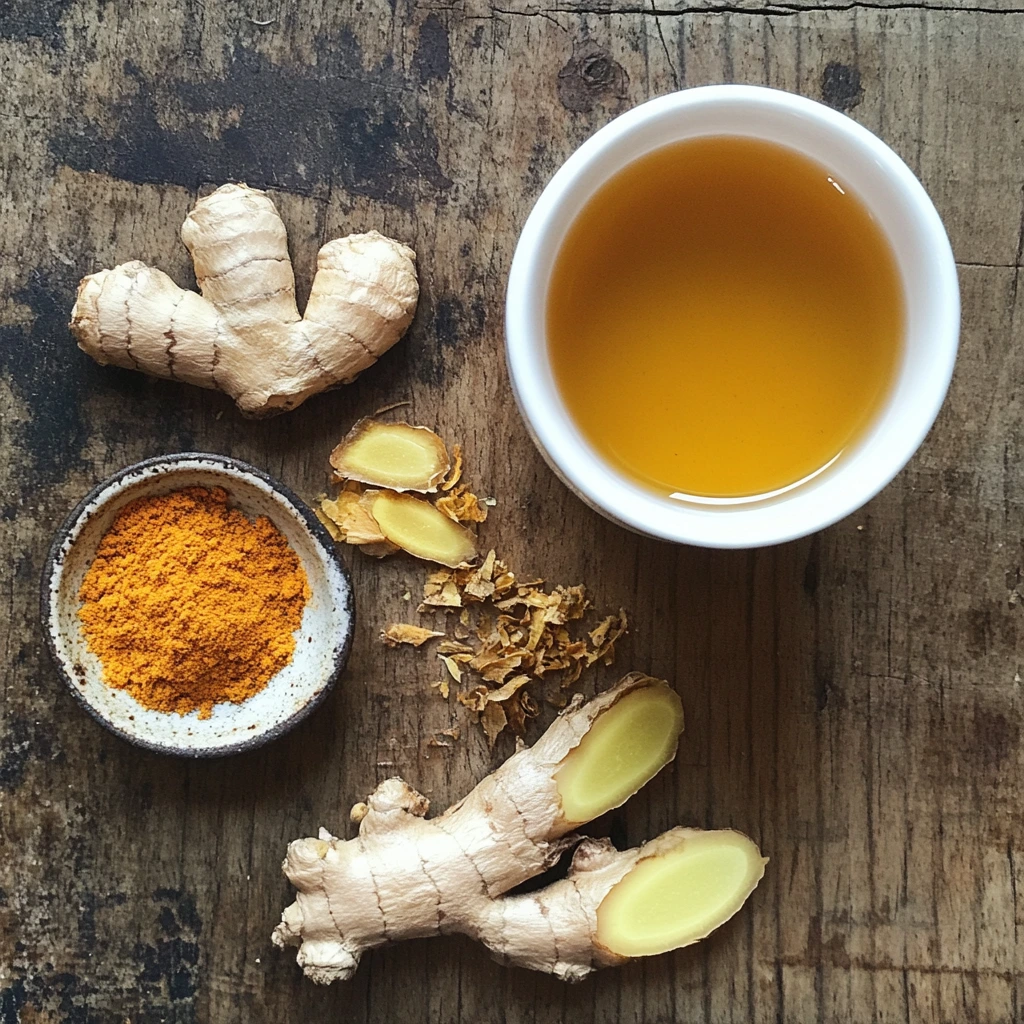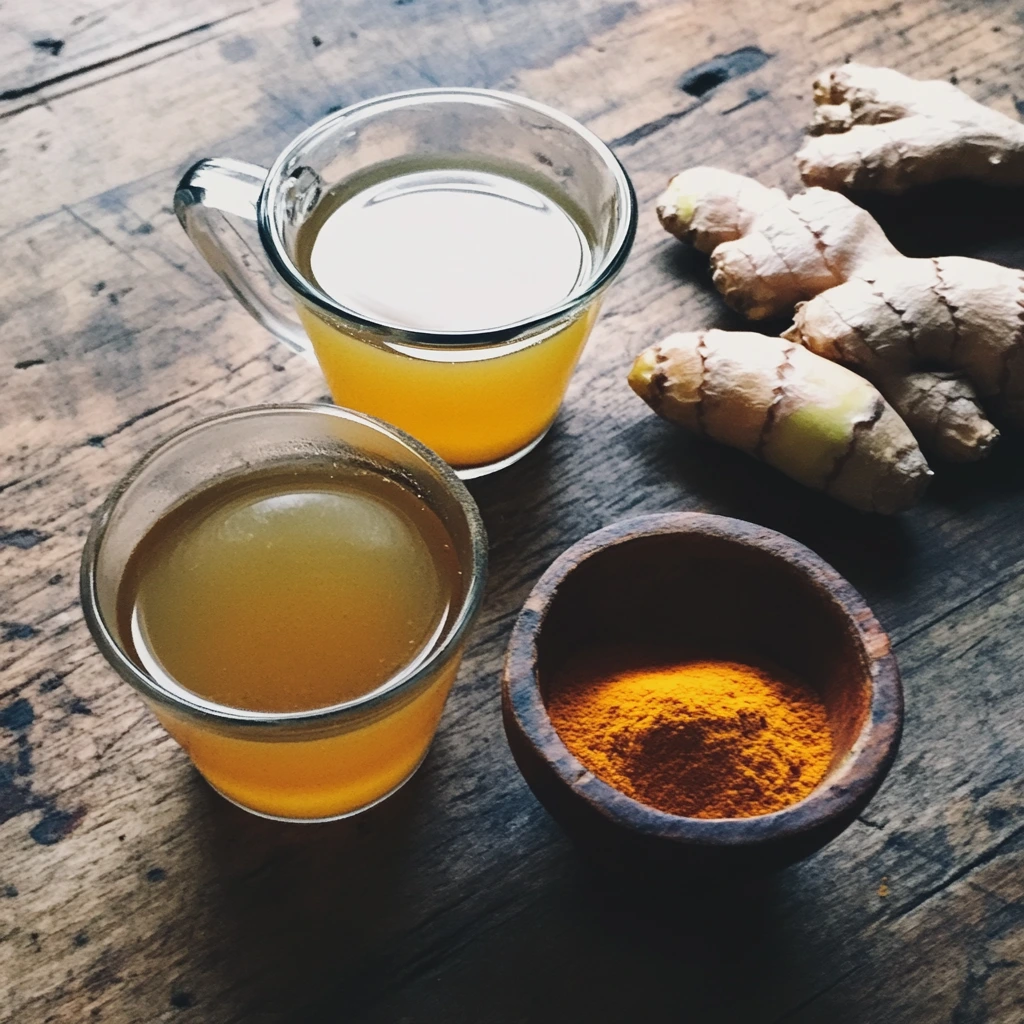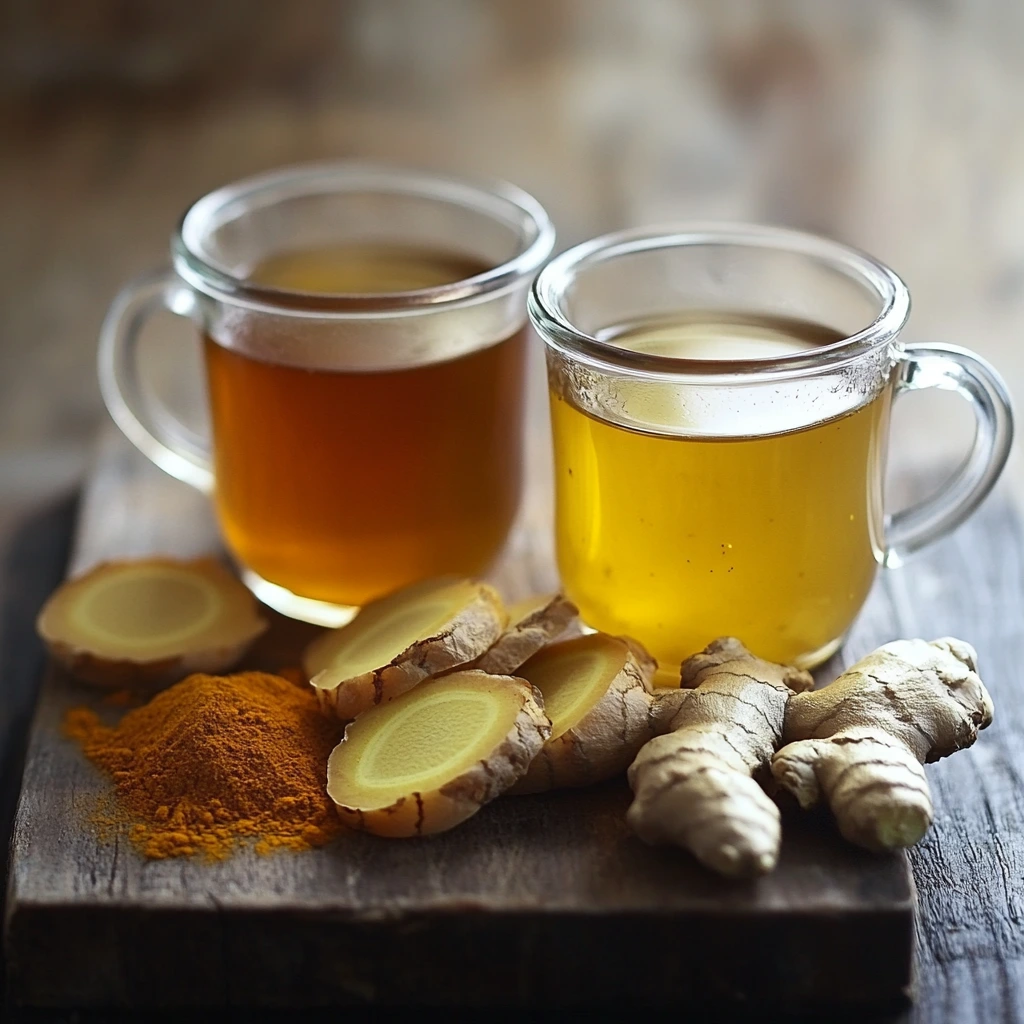
Introduction to Turmeric and Ginger
Turmeric and ginger have been staples in both the kitchen and traditional medicine for centuries. These powerful roots are known for their distinct flavors and wide-ranging health benefits. But is it okay to drink turmeric and ginger every day? Let’s Analyze into their origins, nutritional profiles, and potential benefits to understand why these ingredients have stood the test of time.
History and Origins of Turmeric and Ginger
Turmeric, a golden-yellow spice, originates from South Asia, particularly India. It has been a cornerstone of Ayurvedic medicine for over 4,000 years. On the other hand, ginger, known for its pungent and spicy flavor, hails from Southeast Asia. Ancient Chinese and Indian texts frequently praised ginger for its healing properties, making it one of the earliest traded spices in the world.
Both turmeric and ginger were not only valued for their culinary versatility but also for their medicinal uses. Traditional practices relied on these roots to treat ailments such as digestive issues, inflammation, and colds.
Common Uses in Culinary and Medicine
- Culinary:
- Turmeric is often used in curries, soups, and rice dishes.
- Ginger finds its place in teas, stir-fries, and baked goods like gingerbread.
- Medicinal:
- Turmeric’s active compound, curcumin, is celebrated for its anti-inflammatory properties.
- Ginger’s bioactive compounds, such as gingerol, help with nausea and digestion.
These roots are not just ingredients but also natural remedies incorporated into daily diets around the world.
Nutritional Profiles of Turmeric and Ginger
Both turmeric and ginger pack a punch when it comes to nutrition. Understanding their key nutrients can help answer whether it’s okay to consume them daily.
Key Nutrients Found in Turmeric
- Curcumin: A potent anti-inflammatory and antioxidant compound.
- Vitamins: Contains vitamin C and some B vitamins.
- Minerals: Rich in potassium, iron, and manganese.
- Dietary Fiber: Helps support digestive health.
Curcumin, in particular, is believed to play a significant role in reducing inflammation and fighting oxidative stress.
Key Nutrients Found in Ginger
- Gingerol: The primary bioactive compound with anti-inflammatory and antioxidant effects.
- Vitamins: Small amounts of vitamin B6 and vitamin C.
- Minerals: Includes magnesium and potassium.
- Essential Oils: Contribute to its unique aroma and therapeutic benefits.
Ginger’s gingerol content is responsible for its medicinal benefits, particularly in alleviating nausea and digestive discomfort.
Synergistic Benefits of Combining Turmeric and Ginger
Combining turmeric and ginger can amplify their individual benefits. The synergy between curcumin and gingerol Refines their anti-inflammatory and antioxidant properties, making them more effective together than alone. Learn more about how to drink turmeric and ginger for weight loss.
- Refined absorption of curcumin with ginger’s compounds.
- Improved digestive health due to complementary actions.
- Stronger immune support when consumed as a pair.
Potential Health Benefits of Drinking Turmeric and Ginger Daily

Anti-inflammatory Properties For Drink Turmeric and Ginger
Both turmeric and ginger are renowned for their anti-inflammatory properties. Chronic inflammation is linked to various diseases, including arthritis and heart conditions. Drinking a turmeric and ginger infusion daily may help mitigate inflammation by:
- Reducing levels of inflammatory markers.
- Supporting joint and muscle health.
- Alleviating symptoms of inflammatory conditions like osteoarthritis.
Digestive Health Boost
Ginger is well-known for aiding digestion, while turmeric helps stimulate bile production. Together, they:
- Ease bloating and gas.
- Support nutrient absorption.
- Soothe an upset stomach.
Adding a cup of turmeric and ginger tea to your daily routine can improve overall digestive function.
Immunity Support
Turmeric and ginger are powerhouse ingredients packed with immune-boosting properties that work to protect the body against infections. Not only do they help in fighting off harmful bacteria and viruses, but they also play a crucial role in strengthening the body’s natural defenses. Additionally, these spices are rich in antioxidants, which are essential for neutralizing free radicals that can cause oxidative stress and damage to cells. Furthermore, their anti-inflammatory compounds contribute to overall health by reducing inflammation, which is often linked to chronic illnesses. Incorporating turmeric and ginger into your diet can be a simple yet effective way to support your immune system, Refine your overall well-being, and promote resilience against everyday health challenges.
To learn more about their impact, Investigate whether it’s okay to drink turmeric and ginger every day.
Benefits for Skin and Hair
Regular consumption of turmeric and ginger can improve skin and hair health by:
- Reducing acne and blemishes due to anti-inflammatory properties.
- Promoting a natural glow with antioxidants.
- Strengthening hair follicles for healthier growth.
Potential Risks and Considerations
While the benefits are numerous, it’s important to consider the potential risks of drinking turmeric and ginger every day.
Possible Side Effects
Turmeric, when consumed in high doses, can potentially cause stomach upset, making it important to moderate its intake. Similarly, ginger, though widely appreciated for its soothing properties, may lead to heartburn or mouth irritation in sensitive individuals. Furthermore, both turmeric and ginger share anticoagulant properties, which means that excessive consumption could thin the blood. As a result, this might increase the risk of bleeding, particularly for individuals taking blood-thinning medications. Therefore, it is crucial to exercise caution and seek professional advice when incorporating these spices into your diet, especially in large amounts.
Drug Interactions
Both turmeric and ginger can interact with medications, such as:
- Blood thinners like aspirin or warfarin.
- Diabetes medications.
- Antacids and acid-reducing drugs.
If you are on medication, consult a healthcare professional before making turmeric and ginger a daily habit.
Recommended Dosages about Drink Turmeric and Ginger
Moderation is key when consuming turmeric and ginger daily, as maintaining appropriate intake levels assures you reap their benefits without unwanted side effects. For turmeric, experts recommend 1 to 3 grams of dried turmeric powder or 400 to 600 milligrams of curcumin supplements per day. Similarly, when it comes to ginger, consuming 1 to 2 grams of fresh ginger or 250 to 500 milligrams of ginger supplements is generally considered safe and effective. By staying within these suggested limits, you not only avoid potential risks but also maximize the health advantages these spices offer, such as reducing inflammation, boosting immunity, and improving digestion. Furthermore, exceeding these amounts may lead to adverse effects, such as stomach discomfort or interactions with medications, underscoring the importance of mindful consumption. Thus, incorporating turmeric and ginger in moderate amounts allows you to enjoy their natural goodness while maintaining your overall well-being.
How to Incorporate Turmeric and Ginger into Your Daily Routine

Recipes for Turmeric and Ginger Teas
Making a soothing tea is one of the easiest ways to enjoy turmeric and ginger daily. Here’s a simple recipe:
Ingredients:
- 1 teaspoon of grated fresh ginger.
- 1 teaspoon of turmeric powder or fresh turmeric.
- 2 cups of water.
- Honey and lemon to taste.
Instructions:
- Boil water and add the ginger and turmeric.
- Simmer for 10 minutes.
- Strain the tea and add honey or lemon for flavor.
This tea can be consumed warm or chilled for a refreshing beverage.
Creative Uses Beyond Tea
Turmeric and ginger can be included in your diet in other innovative ways:
- Smoothies: Blend fresh ginger and turmeric with fruits like mango or pineapple.
- Golden Milk: Combine turmeric with milk, a pinch of black pepper, and a touch of honey.
- Soups and Stews: Add grated ginger and turmeric to Refine flavor and nutrition.
- Salad Dressings: Mix turmeric powder and grated ginger into vinaigrettes.
For an immunity-boosting kick, try this simple ginger turmeric shot recipe.
Scientific Studies on Turmeric and Ginger
The growing interest in natural remedies has led to a surge in attention to turmeric and ginger. These two powerhouse ingredients, long celebrated for their potential health benefits, have captured the spotlight in both traditional medicine and modern wellness trends. Moreover, their widespread use in various cuisines has made them easily accessible to people around the globe. As a result, scientists and health enthusiasts alike are eager to Probe their advantages. But what does science actually say about their daily consumption? Are they truly as beneficial as they seem, or do their effects depend on specific conditions and dosages? Let’s Analyze deeper into the research and uncover the truths behind these golden staples of health and nutrition.
Evidence Supporting Health Claims
Research has repeatedly highlighted the benefits of turmeric and ginger. These spices are rich in bioactive compounds like curcumin and gingerol, which possess antioxidant and anti-inflammatory properties. Here are some well-supported claims:
- Inflammation Reduction: Curcumin, the main compound in turmeric, has shown promise in reducing inflammation, which is linked to chronic diseases like arthritis and heart conditions.
- Improved Digestion: Ginger is often used to alleviate nausea and support a healthy digestive system.
- Immune Support: The antioxidant properties in both turmeric and ginger help strengthen the body’s defenses.
Although the evidence is promising, it’s important to note that most studies involve specific doses, and everyday consumption may not provide identical results.
Ongoing Research Areas
While the existing data supports the benefits of turmeric and ginger, ongoing research is uncovering even more potential. Some key areas include:
- Cancer Prevention: Early studies suggest that the anti-inflammatory effects of these spices could play a role in preventing certain cancers.
- Mental Health Benefits: Curcumin’s ability to cross the blood-brain barrier has led to studies exploring its impact on depression and Alzheimer’s disease.
- Blood Sugar Regulation: Preliminary evidence indicates that ginger may help stabilize blood sugar levels in individuals with diabetes.
These ongoing investigations highlight the dynamic nature of turmeric and ginger research, emphasizing the need for balanced consumption and realistic expectations.
FAQs About Drinking Turmeric and Ginger Every Day
Can turmeric and ginger reduce belly fat?
Turmeric and ginger may contribute to reducing belly fat, but their effects are not a direct solution. For example, their anti-inflammatory properties can help combat inflammation-related weight gain. Additionally, ginger’s role in improving digestion and boosting metabolism may indirectly support weight management. However, combining these ingredients with a balanced diet and regular exercise is crucial for noticeable results. As with any weight-loss effort, consistency and a holistic approach are key.
What happens if you drink ginger and turmeric every day?
Drinking ginger and turmeric daily can offer several benefits, but moderation is essential. Over time, the antioxidant properties of these spices may help reduce oxidative stress and support a healthier immune system. Additionally, regular consumption could improve digestion and reduce mild inflammation. Nevertheless, excessive intake might lead to side effects, such as stomach discomfort or interactions with medications. To assures long-term benefits, it’s best to incorporate these spices as part of a varied diet rather than relying on them exclusively.
Is ginger and turmeric safe for kidneys?
Ginger and turmeric are generally safe for kidney health when consumed in moderation. For instance, their anti-inflammatory and antioxidant compounds can protect the kidneys from oxidative damage. However, high doses of turmeric might lead to an accumulation of oxalates, which could contribute to kidney stones in susceptible individuals. Drinking plenty of water and sticking to recommended amounts can help minimize potential risks while supporting overall kidney function.
Is it better to take turmeric and ginger at night or in the morning?
Whether turmeric and ginger are more effective in the morning or at night depends on your health goals. For instance, consuming them in the morning can kickstart digestion and metabolism, making it an energizing start to the day. On the other hand, taking them at night may promote relaxation and aid in digestion before bedtime. Choosing a consistent time that aligns with your routine assures you can fully enjoy their benefits. Pairing turmeric with black pepper is a good idea, regardless of timing, to Refine absorption.
Conclusion About Drink Turmeric and Ginger Every Day
The question, “Is it Okay to Drink Turmeric and Ginger Every Day?”, ultimately depends on individual health needs and preferences. Both spices offer a wealth of potential benefits, from reducing inflammation to supporting digestion. However, moderation and proper preparation are crucial to avoid adverse effects. Consulting with a healthcare provider assures that daily consumption aligns with your specific health goals. By incorporating turmeric and ginger thoughtfully into your routine, you can enjoy their natural advantages while maintaining a balanced approach.

3 thoughts on “Is it Okay to Drink Turmeric and Ginger Every Day? Benefits & Risks”